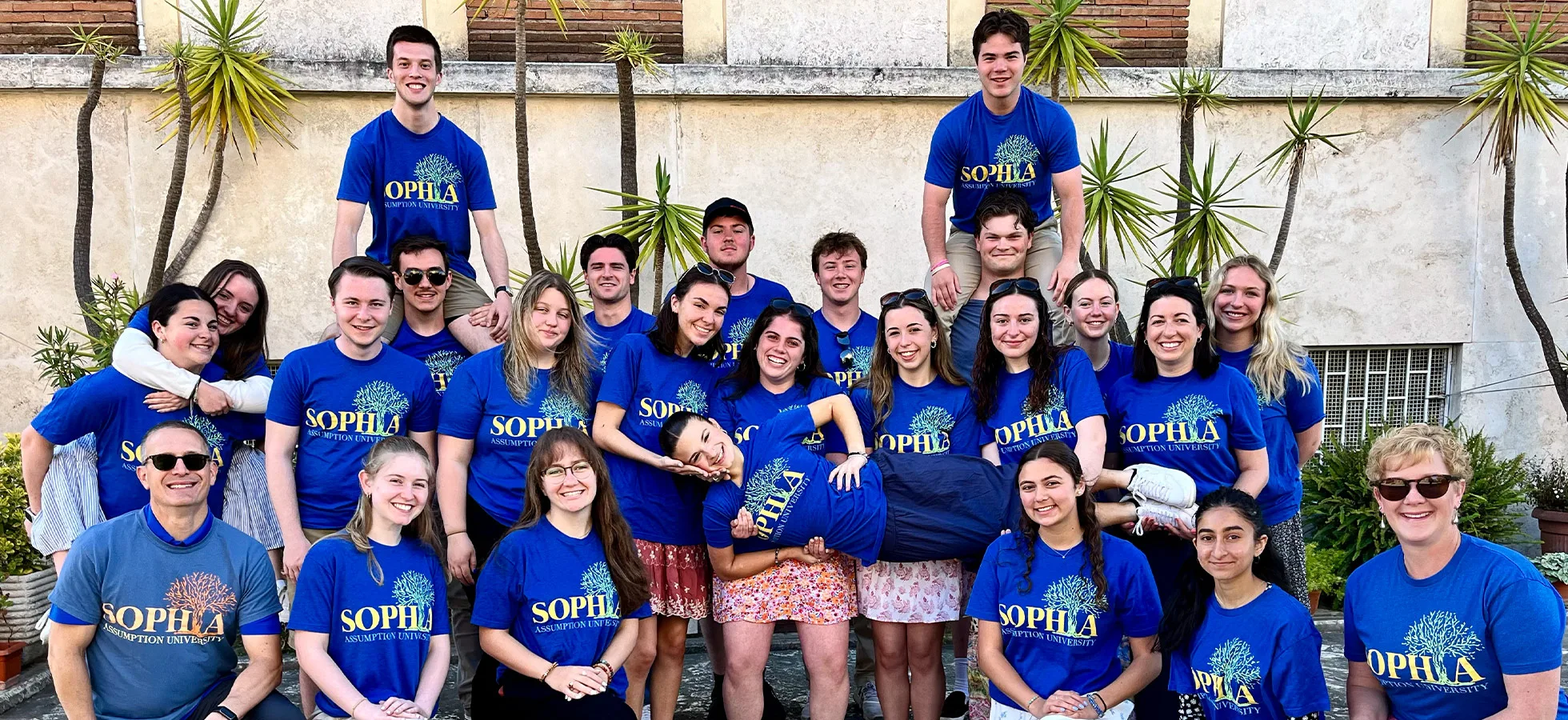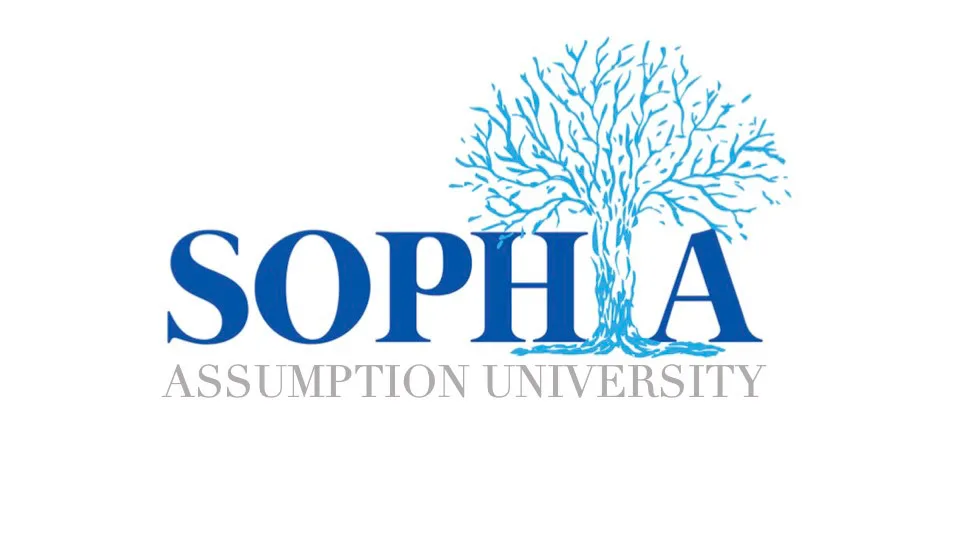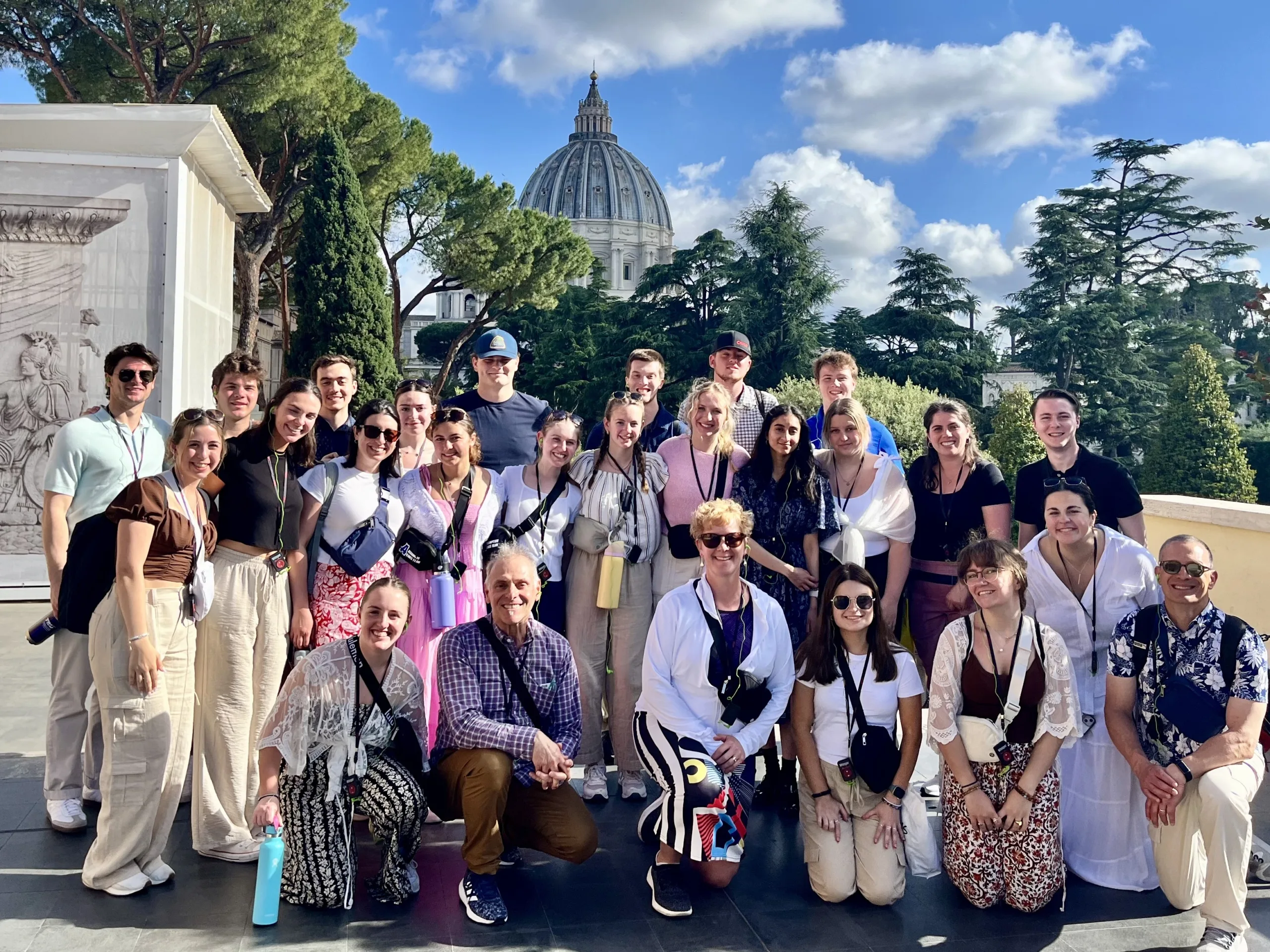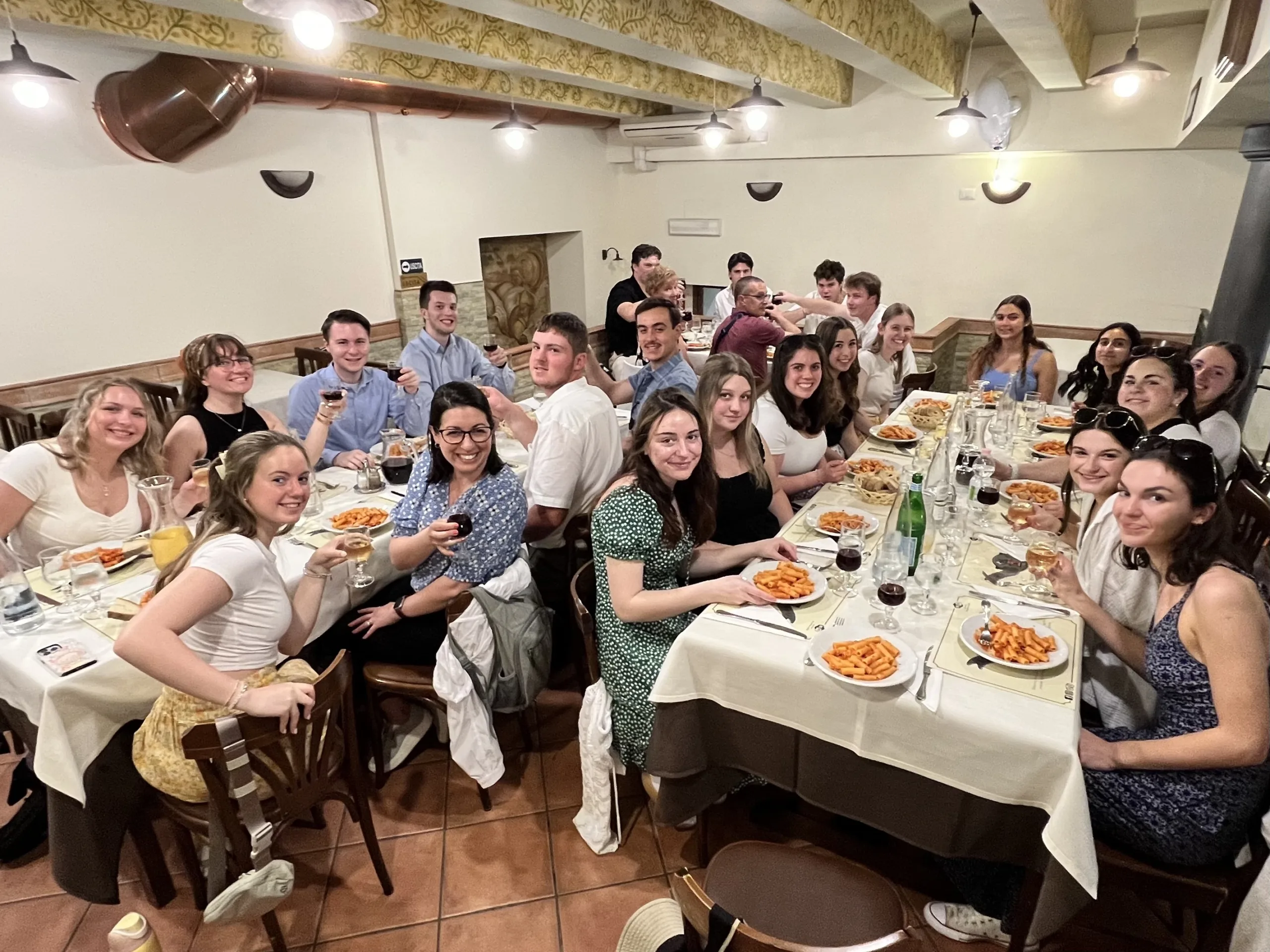SOPHIA Program Celebrates 10 Year Anniversary, Takes Capstone Rome Trip

Each academic year, a group of 24 determined, dedicated Assumption sophomores take part in the SOPHIA Program: the Sophomore Initiative at Assumption. For ten years, the program has sparked important conversations among students while teaching them important lessons about life’s meaning, purpose, and their callings in the world around them.
When developing SOPHIA, faculty and staff wanted to create a program that focused on sophomore students, as the second academic year for students is crucial in their academic and personal development. The creators of the program recognized that students were having conversations about their personal vocations and passions through residential life and in a few courses, but not in a co-curricular academic setting, and sought to remedy that.
As a result, the SOPHIA program was created thanks to an initial grant from NETVue (the Network for Vocation in Undergraduate Education), a network of colleges that promotes vocational exploration. Since then, SOPHIA has provided programming, mentorship, and a common course for sophomore students to explore their vocations in small groups and in conversations with dedicated faculty members.

“In order to welcome all students into the conversation about vocation, we invite students to think about and to explore their callings in various ways,” said Esteban Loustaunau, Director of the SOPHIA Program. “‘Vocation’ is about careers, but also about faith, relationships, communities, times of leisure, and more. It also needs to be dynamic, able to change the many shifting contexts students will face over the years. And, especially in college, students should think of vocation from a variety of academic disciplines, fields, and perspectives.”
Since the program’s inception in 2014, it has consisted of four major components: a common course for students, mentoring groups, a fall retreat, and a spring capstone trip to Rome to wrap up the program. The program caps at 24 students, who join four smaller groups of six to ensure genuine and meaningful connection between them and their faculty mentors.
“I’ve loved all of my professors at Assumption, but I’ve never formed a bond with them like we were able to do through this program, specifically with my mentor, Professor [Elizabeth] Walsh,” said Sofia Bruno ’26, a Health Sciences major. “We formed a really close bond, and I feel like that relationship is really rewarding, because it was no longer just a relationship with a professor; she’s a role model, someone to look up to, someone you can go to if you need something.”
The common course, developed especially for this program, has had a few iterations since the start of the program. The first course was a philosophy course about living a life of meaning; the second an English course, with readings focused on vocation. The current course, a comparative literature course titled “The Figure of the Seeker,” was developed by Loustaunau as a course that examines cultural texts as they relate to vocation, purpose, and meaning.
“The course has the idea that we are all seekers of our callings,” said Loustaunau. “It explores questions such as, ‘who are we, and to whom do we belong?’ ‘How can we connect others in society?’”
“It’s a literature class – but it isn’t just about literature,” said Bruno. “We spoke about quitting, and what it means to quit…how to find your purpose…it was a lot of self reflection. We did write essays about the books we read, but it wasn’t a typical literature class.”
“The class is centered around us finding our calling by analyzing different pieces of literature,” said Hala Jaber ’26, a biotechnology and molecular biology major. “Those pieces of literature featured others attempting to find their callings. Throughout the class, the lives that we live were often referred to as our ‘journey,’ or our pathway, and we came to see our lives as our own stories.”

SOPHIA students and faculty mentors on the capstone trip to Rome in May 2024.
On this year’s capstone trip to Rome, students were able to live out those journeys, connecting both their own experiences and the experiences of those they read about in class to the real world around them.
“Navigating through the Rome trip was kind of like a journey,” said Jaber. “To me, it was cool to see those different aspects of a journey play out in my own life. And now, I see our trip as a chapter of my story.”
Loustaunau noted the importance of the capstone trip to not only close out the experience students have during SOPHIA, but to also unveil in a real way what the students have learned about themselves and the world around them during the program.
“By the time we get to Rome, the mentors and the students all know each other very well,” said Loustaunau. “What you see, the places where we take students, the whole experience helps them think deeply and even sometimes brings out a lot of emotions…they feel not just joyful, but also vulnerable. They really begin to question and face a lot of both their strengths and their worries, their uncertainties. But they also realize that they are not alone. They are in this community of faculty mentors and students where they can voice their needs and their discoveries with one another. It can be very transformative.”
Professor Richard Bonanno, professor of Italian and Founding Director of Assumption’s Rome Program, led the trip to Rome this year, and emphasized how he was able to witness the transformation of the students on the trip right before his eyes.
“The trip exceeded expectations and was quite intense in the most positive way. I was not familiar with many of the students prior to departure, but the group turned out to be very special,” said Bonanno. “It was truly a beautiful learning experience for all. For me, in particular, it was touching to see how the students had matured in terms of the objective of the SOPHIA program.”
One of the major priorities of the Rome capstone, along with SOPHIA, is the creation of community within students and faculty. Through shared experiences, meals, and even just navigating through an unfamiliar city together, those on the trip found that they created bonds and memories that will last a lifetime.
“This trip is a reflection of what we’ve tried to promote over the years on the Rome campus, the community-centered approach to an academic experience,” said Bonanno. “We traveled together, we had lunch together, we had dinner together, we had discussions together. Getting students to come together as a community through this experience happened in a very organic way.”

SOPHIA students dining together in Rome.
“It wasn’t necessarily the architecture or the ruins or the excavations that left me with such eye-opening revelations of myself, but instead it was the really deep, sincere interactions with my friends,” said Jaber. “What we discussed in our small groups are pieces of wisdom and memories that I’m going to keep with me forever.”
“On the last night, we all went to the Trevi Fountain together,” said Bruno. “It was a perfect end to this trip…it was bittersweet knowing that it was our last time together before we all went our separate ways. It was symbolic because we made wishes in the foundation, and we said that no matter which different direction we all go in after this trip, we’re always going to have these memories together. We’re always going to have this experience that is going to connect us.”
Over time, the SOPHIA program has undergone many changes in locations, courses, mentors, and, of course, students, but the core mission has always remained the same: to help sophomore students connect their passions to their vocations and their vocations to one another. Recently, the program has changed from offering the academic course in the fall semester to the spring semester, which will continue. And, in the fall, another new chapter will begin for SOPHIA, as the spring capstone trip will be to Washington, D.C, led by Assumption President Greg Weiner.
The experience that SOPHIA provides to students does not end when they return from their capstone trips, however.
“These students stay together. Some of them travel together, they go back to Rome,” said Loustaunau. “When there’s a wedding, I often see on Facebook the line of the wedding party, and I go ‘SOPHIA, SOPHIA, SOPHIA, SOPHIA…’ They’re still connected. And a lot of the students are so different from one another, they come from different walks of life. It’s really great to see, and it’s a reflection of what type of academic community we are and strive to be at Assumption.”

Professor David Crowley, Director of ASPIRE, speaking at the SOPHIA 10th Anniversary Celebration on April 6, 2024.
Along with creating lifelong bonds and experiences students will never forget, the SOPHIA program also extends throughout the rest of students’ journeys at Assumption, with the ASPIRE (Alumni and Student Partnerships in Reflective Engagement) program. ASPIRE seeks to carry on the conversations started by SOPHIA about vocation and purpose as students continue through their years at Assumption and beyond as alumni.
“The ASPIRE program is building on those relationships and engagements for juniors, seniors, and alumni,” said Loustaunau. “ASPIRE is for everyone; you don’t have to have been part of SOPHIA to be part of ASPIRE. During junior year, students sometimes say, ‘I wish I had a mentor. I wish I had someone to tell me more about or to help me develop my own ideas about living a life of meaning.’ And ASPIRE is there to make those connections happen.”
Along with ASPIRE, the Center for Purpose and Vocation (CPV) will be offering vocational engagement opportunities for students who want to have these important discussions through Residential Life. Starting in fall 2024, the CPV will invite student residents in the Living Learning Center (LLC) to take part in activities, group discussions, and other kinds of programming. This programming will be intentionally flexible to engage with students who may not be able to commit to a full-year academic program.
For future students, Bruno and Jaber emphasized that SOPHIA is a program that will change your life, change your perspective, and may ultimately lead you to find your own calling.
“All the things that you experience in this program serve as a foundation for allowing you to think about the life you want to live,” said Jaber. “It’s important to go through these motions, trying to find our calling, our purpose. We become so enveloped in academics and gaining work experience and getting internships that people kind of push that journey to the side. I feel like if you want to live a fuller life, a better life, you have to partake in that journey.”
“Everyone needs to go out of their comfort zone at some point in their life, and this is the perfect way to do it,” said Bruno. “You’ll make new friends. You’ll learn more about yourself and your purpose. And you ultimately get to embark on your own pilgrimage.”
